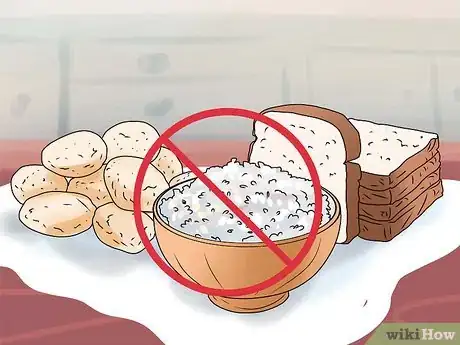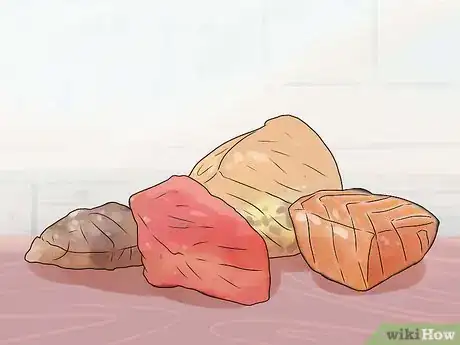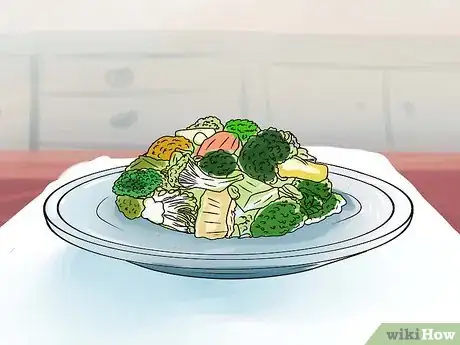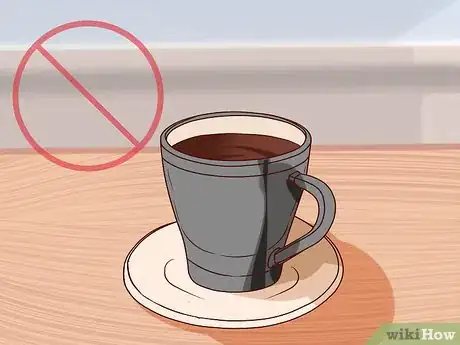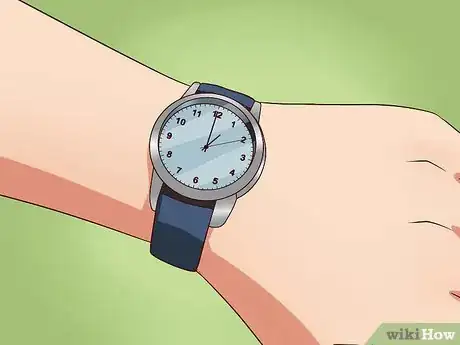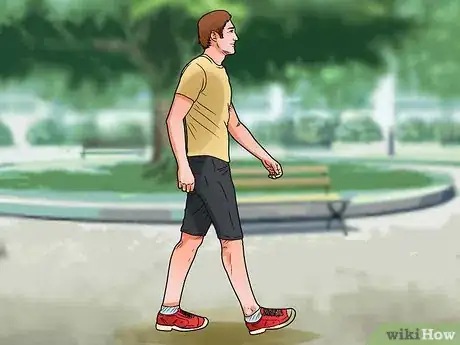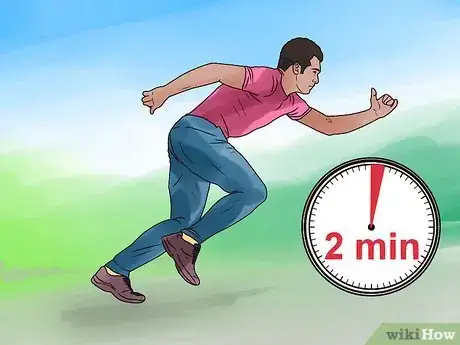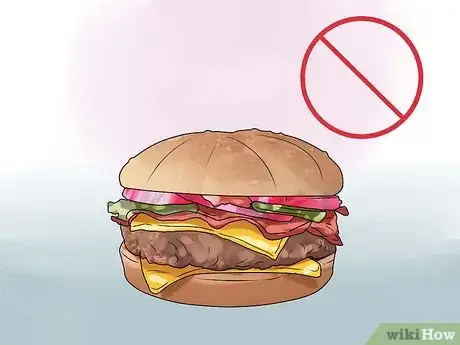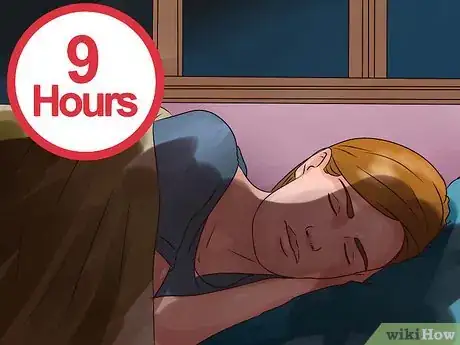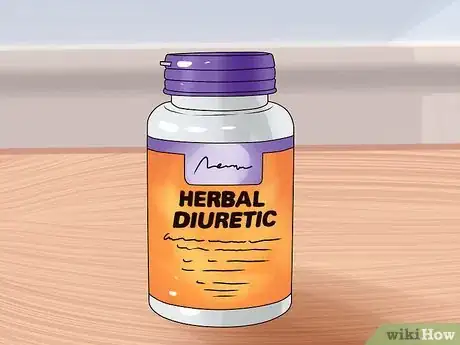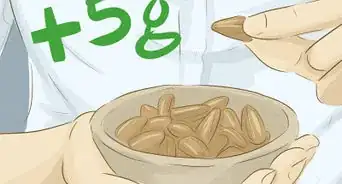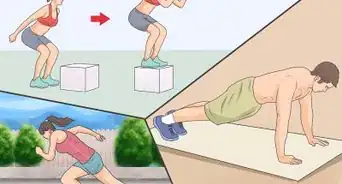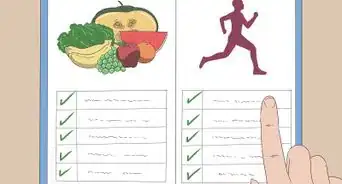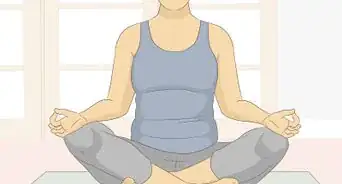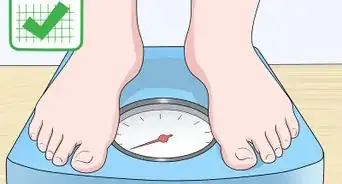This article was medically reviewed by Luba Lee, FNP-BC, MS. Luba Lee, FNP-BC is a Board-Certified Family Nurse Practitioner (FNP) and educator in Tennessee with over a decade of clinical experience. Luba has certifications in Pediatric Advanced Life Support (PALS), Emergency Medicine, Advanced Cardiac Life Support (ACLS), Team Building, and Critical Care Nursing. She received her Master of Science in Nursing (MSN) from the University of Tennessee in 2006.
There are 19 references cited in this article, which can be found at the bottom of the page.
wikiHow marks an article as reader-approved once it receives enough positive feedback. This article received 21 testimonials and 84% of readers who voted found it helpful, earning it our reader-approved status.
This article has been viewed 2,598,262 times.
Whether you have a special occasion coming up or you just want to feel healthier, sometimes you might want to lose weight fast. Losing 5 kilograms in one week is a difficult goal to reach, but you may be able to do it with the right diet and exercise strategies. However, losing weight slowly will make it easier to maintain your weight loss.
Steps
Changing Your Diet
-
1Cut back on carbohydrates. Studies have shown one of the quickest ways to lose weight is by following a low-carb diet.[1] Limit carbohydrate-rich foods if you want to come close to losing 5 kg in one week.
- Carbohydrates are found in a wide variety of foods. Only limit those that are mostly carbohydrates like grain-based foods. Bread, pastries, rice, pasta and other grains are carbohydrate-rich and can be limited safely, as many of their nutrients are present in other foods.
- Dairy products, starchy vegetables, and fruits also contain carbohydrates. Minimize these in your diet, but do not completely cut these foods out. They provide valuable nutrition to your diet.[2]
- Switch out these foods for low-glycemic grains and non-starchy vegetables. For example, replace your bread, cereal and white rice with steel cut oats or brown rice. For vegetables, fill your plate with foods like cauliflower, broccoli, cucumber, mushrooms, and asparagus.
-
2Include lean protein at each meal. In addition to following a low-carb diet, focus on consuming adequate amounts of lean protein. Higher protein diets in combination with low-carb are good for quicker weight loss.[3]
- Focus on leaner sources of protein. They are lower in calories which can help support weight loss. Try: skinless poultry, eggs, lean beef, seafood, legumes, and tofu.
- Include a source of protein at each meal and snack. This will help you reach your daily recommended amount. One serving of protein is about 3–4 oz or about the size of a check book.[4]
- Protein will also help support weight loss by keeping you feel more satisfied longer which can help manage your hunger and desire to eat.
Advertisement -
3Fill half of your plate with non-starchy vegetables. To round out your meals, make the remaining half of your plate mostly vegetables and the occasional serving of fruit. These low-calorie foods will provide you with many vital nutrients. However, stick to non-starchy veggies to keep your calorie count low and your blood sugar stable.
- The USDA recommends that you make half your plate a fruit or a vegetable. This is acceptable for most diets, even if you're trying to lose weight; however, fruits are also higher in carbohydrates and sugars, so should be limited.
- Include at least one serving of vegetables at each meal. One serving is generally about 1 cup or 2 cups of leafy greens.[5] If you do go for fruit, stick to 1/2 cup chopped or one small piece.[6]
- Both fruits and vegetables are very low calorie. Making half of your meal a low-calorie food can help cut down on overall calorie intake and support your weight loss.
-
4Drink adequate fluids. Regardless of whether or not you're trying to lose weight, it's important to drink adequate fluids. However, drinking enough water does support weight loss.
- Most health experts will recommend you drink a minimum of 2000 ml (about 64 oz or eight glasses of water) daily; however, this is just a rule of thumb. Recommendations even go up to 13 glasses of water daily.[7]
- Stick to calorie-free, hydrating fluids like water, flavored water, decaf coffee and decaf tea (with no milk or sugar).
- When you're even slightly dehydrated your body sends signals to your brain that feel and seem very much like hunger. This can trigger you to eat or snack and consume more calories than you need.[8]
- Also try drinking a glass or two of water prior to eating. This may help you feel fuller and more satisfied with less food.
-
5Cut out drinking to help you lose weight. Not only will alcohol add to your calorie count, it can also trigger you to eat more. Additionally, most people drink more than one serving of alcohol at a time, meaning the calories add up quickly. Cutting out drinks may help you slim down faster and stick to your goals.[9]
- Eliminating alcohol from your diet may also help you have more energy.
-
6Limit your caffeine consumption so you don't overwhelm your system. Ingesting small amounts of caffeine may help you lose weight because it can temporarily boost your metabolism and may reduce your appetite. However, caffeine can also cause jitters and acts as a diuretic, which means it could dehydrate you. Additionally, many sources of caffeine, such as coffee, tea, and chocolate, typically contain added calories from things like milk and sugar.[10]
- When you drink tea or coffee, don't add sugar or other sweeteners.
-
7Sip on matcha or green tea to aid your weight loss. Matcha and green tea are packed with antioxidants, and they may help increase your weight loss. Drinking matcha or green tea regularly can increase your metabolism in the hours after you drink the tea.[11]
- Don't add sweetener or anything else to your tea, as it will increase your calorie consumption.
-
8Consider finishing your meals for the day at least 4 hours before bed. Cutting out nighttime eating may help you cut back on calories, especially if you tend to eat a lot of snacks at night. While eating late in the day has no effect on your metabolism or how your body uses calories, nighttime is a prime time for mindless eating.[12]
- For instance, you might decide to stop eating for the day at 7:00 p.m.
- As another benefit, stopping your meals early may help you burn more fat if you go at least 12 hours without eating. For instance, if you stop eating at 7:00 p.m. and don't eat breakfast until after 7:00 a.m., then your body may turn to your fat stores for energy. This may aid weightloss.[13]
-
9Use meal replacements if they're more convenient for you. Most health professionals and dietitians will tell you that losing 5 kg in a week might not be a safe or realistic goal; however, using meal replacement shakes or bars, you may be able to come close to your weight loss goal.[14]
- For instance, you can make your own meal replacement smoothie if you have a blender. Add a handful of almonds, a carrot, a handful of spinach, a few slices of green apple, half a banana, a 1 teaspoon (4.9 mL) of coconut oil, and water or almond milk to the blender, then process it until it's smooth. If you're interested in making meal replacement smoothies, you can a variety of recipes online.
- Meal replacements are generally very low-calorie and high-protein shakes and bars. They are acceptable as meal replacements because they contain enough protein, carbohydrates, fiber and other essential vitamins and minerals similar to food.[15]
- There are a variety of meal replacement plans available. Some are offered through doctors offices and are medically supervised by the physician and a dietitian. These programs are generally more expensive; however, they are considered safer.
- You can also consider purchasing meal replacements at a grocery store or health food store. Research the products online first and choose a plan that will fit into your budget and lifestyle.
- Meal replacements are only meant to be a very temporary diet program. Do not follow these low-calorie diets for more than one to two weeks.
Including Regular Exercise
-
1Go for 150 minutes of cardio. Cardio or aerobic exercises are the activities that are responsible for higher calorie burns. Combined with a diet program, cardio can help you lose weight quickly.[16]
- The USDA recommends participating in at least 150 minutes or about 2 1/2 hours of moderate-intensity physical activity each week. But if you're looking to burn even higher amounts of calories, aim for 300 minutes each week.[17]
- Moderate intensity activity will differ for everyone. You should aim to be out of breath and sweating slightly and be able to sustain the activity for at least 20–30 minutes.
- Include exercises like: fast walking, jogging/running, swimming, kick boxing or using the elliptical.
-
2Do two to three days of interval training. In addition to your cardio, you may want to consider incorporating higher intensity interval training, or HIIT. HIIT can help burn additional calories each week.[18]
- HIIT is a newer type of exercise. The studies that have been done show that you can burn a significant amount of calories in a shorter amount of time. In addition, your body burns more calories from fat.[19]
- HIIT is also great for increasing your overall metabolism or your body's ability to burn additional calories for hours after you've completed the exercise — sometimes up to 24 hours.[20]
- An example of a HIIT exercise would be: 1 minute of sprinting followed by 1.5 minutes of a moderate jog. These activities would be repeated for about 20 minutes, plus a 5 minute warm up and a 5 minute cool down.
-
3Increase your lifestyle activity. To continue to increase your overall calorie burn for the week, try to increase your movement throughout the day. The more mobile and active you are in general, the more calories you burn per day.
- Lifestyle or baseline activity are things you do on a typical day — walking to and from your car or doing household chores.
- Increase your participation in these types of activities and increase your steps as much as possible. Try taking the stairs a few extra times, walking the long way to and from your destination, parking father away or doing a quick jog in place during a commercial break.
-
4Skip snacks. Including a healthy snack or two can be a part of a weight loss plan. But if you're interested in losing a lot of weight quickly, ditch the extra snacks to help control overall calories.
- If you're feeling hungry in-between meals, try having a glass of water or unsweetened decaf coffee or tea. The fluid and flavor can help trick your brain that you're feeling satisfied.
- If you must snack, keep your food choices under 100-150 calories. Also make sure they're mostly lean protein to help you meet your protein goal.
- Examples of appropriate snacks include: a handful (8) almonds or other nuts, a glass of soy milk, a tablespoon (15ml) of hummus, a hard boiled egg, or a fat free greek yogurt.[21]
Managing Other Lifestyle Factors
-
1Sleep 7-9 hours each night. Sleep is very important for your health. It takes an even more critical role when you're trying to lose weight. Even if you're only dieting for a week, adequate sleep is vital.[22]
- When you don't sleep well, your body fights against you to lose weight. For one, lack of sleep can trigger your body to release higher levels of hormones that cause you to feel hungry. In addition, those who are sleep deprived typically crave higher fat foods.[23]
- Aim for at least 7-9 hours of sleep each night. Try to go to bed earlier and sleep in later if possible. Also try to reduce devices that make sound or light to help ensure you get a sound sleep.
-
2Manage stress. Like sleep, excess stress can make it more difficult for your body to lose weight.[24] Manage and reduce stress as much as possible.
- Stress is something everyone experiences. When you have continuous stress, even minimal stress, your body produces extra cortisol. This hormone makes it difficult for you to lose weight. In addition it can make your feel more tired and hungry.[25]
- Incorporate de-stressing techniques and activities into your daily routine. Try: going for walk, taking a hot shower, talking to a friend or family member, watching a good movie or reading a book.
- If stress is something that's difficult to manage and is causing emotional eating or disrupting your ability to eat healthy and lose weight, consider seeing a life coach for additional support and counseling.
-
3Take an OTC diuretic. Since larger quantities of weight loss in short amounts of time is difficult, you may want to consider taking an over-the-counter or OTC diuretic. This may help the number on the scale continue to decrease.
- A diuretic is a medication that helps your body excrete excess water. Sometimes due to diet or lifestyle, your body may be hanging onto excess water. This may make you feel puffy, bloated or make the scale reflect a higher weight.
- Take the OTC medication just for a few days. You may notice your body releases enough water to reflect a weight loss of a few pounds over the week.
- It's not safe or recommended to take them long term especially without the supervision of a physician. Always talk to your primary care doctor prior to taking any OTC medication to make sure they are safe and appropriate for you.
Sample Diet and Exercise Plans
Expert Q&A
-
QuestionHow can I lose 1 kg a week?
 Michele DolanMichele Dolan is a BCRPA certified Personal Trainer in British Columbia. She has been a personal trainer and fitness instructor since 2002.
Michele DolanMichele Dolan is a BCRPA certified Personal Trainer in British Columbia. She has been a personal trainer and fitness instructor since 2002.
Certified Fitness Trainer 1 kg of bodyweight - presumably fat - is about 7000 calories. Create a calorie deficit of 1000 calories a day to achieve a 7000 calorie per week deficit. Be advised, though, that the lowest safe calorie intakes are about 1200 for women and 1500 to 1800 for men.
1 kg of bodyweight - presumably fat - is about 7000 calories. Create a calorie deficit of 1000 calories a day to achieve a 7000 calorie per week deficit. Be advised, though, that the lowest safe calorie intakes are about 1200 for women and 1500 to 1800 for men. -
QuestionHow do I lose weight in a week without exercise?
 Michele DolanMichele Dolan is a BCRPA certified Personal Trainer in British Columbia. She has been a personal trainer and fitness instructor since 2002.
Michele DolanMichele Dolan is a BCRPA certified Personal Trainer in British Columbia. She has been a personal trainer and fitness instructor since 2002.
Certified Fitness Trainer It is not recommended to try to lose weight in one week. Aim for slow and steady weight loss that lasts as opposed to a rapid weight loss. Rapid weight loss often results in rebound weight gain.
It is not recommended to try to lose weight in one week. Aim for slow and steady weight loss that lasts as opposed to a rapid weight loss. Rapid weight loss often results in rebound weight gain. -
QuestionIs there a way to lose belly fat in just 2 weeks?
 Luba Lee, FNP-BC, MSLuba Lee, FNP-BC is a Board-Certified Family Nurse Practitioner (FNP) and educator in Tennessee with over a decade of clinical experience. Luba has certifications in Pediatric Advanced Life Support (PALS), Emergency Medicine, Advanced Cardiac Life Support (ACLS), Team Building, and Critical Care Nursing. She received her Master of Science in Nursing (MSN) from the University of Tennessee in 2006.
Luba Lee, FNP-BC, MSLuba Lee, FNP-BC is a Board-Certified Family Nurse Practitioner (FNP) and educator in Tennessee with over a decade of clinical experience. Luba has certifications in Pediatric Advanced Life Support (PALS), Emergency Medicine, Advanced Cardiac Life Support (ACLS), Team Building, and Critical Care Nursing. She received her Master of Science in Nursing (MSN) from the University of Tennessee in 2006.
Board-Certified Family Nurse Practitioner You can try doing intermittent fasting. To do this, fast for 16 hours, then eat healthy meals during your 8 hour feeding period. Choose lean meats or fish, non-starchy vegetables, healthy fats, and fruit. If this diet interests you, look for tips online to help you do it right.
You can try doing intermittent fasting. To do this, fast for 16 hours, then eat healthy meals during your 8 hour feeding period. Choose lean meats or fish, non-starchy vegetables, healthy fats, and fruit. If this diet interests you, look for tips online to help you do it right.
Warnings
- If you have a medical condition, you need to avoid quick weight loss, as it may make your condition worse. This is especially true if you have gallbladder disease, liver disease, or pancreatic disease.⧼thumbs_response⧽
References
- ↑ http://www.mayoclinic.org/healthy-lifestyle/weight-loss/in-depth/low-carb-diet/art-20045831
- ↑ http://www.mayoclinic.org/healthy-lifestyle/weight-loss/in-depth/low-carb-diet/art-20045831
- ↑ http://www.womenshealthmag.com/weight-loss/protein-weight-loss
- ↑ http://www.choosemyplate.gov/protein-foods
- ↑ http://www.choosemyplate.gov/vegetables
- ↑ http://www.choosemyplate.gov/fruit
- ↑ http://www.mayoclinic.org/healthy-lifestyle/nutrition-and-healthy-eating/in-depth/water/art-20044256
- ↑ http://www.health.com/health/m/gallery/0,,20920951_2,00.html
- ↑ https://www.verywellfit.com/should-i-quit-drinking-to-lose-weight-3495749
- ↑ https://www.verywellfit.com/can-caffeine-help-you-lose-weight-1087894
- ↑ https://www.healthline.com/nutrition/matcha-green-tea#benefits
- ↑ https://www.ncbi.nlm.nih.gov/pmc/articles/PMC4425165/
- ↑ https://www.medicalnewstoday.com/articles/322293.php
- ↑ http://www.weightlossresources.co.uk/diet/meal_replacement.htm
- ↑ http://www.diabetes.co.uk/diet/meal-replacement-diet-plans.html
- ↑ http://www.cdc.gov/physicalactivity/basics/adults/
- ↑ http://www.cdc.gov/physicalactivity/basics/adults/
- ↑ http://www.shape.com/fitness/workouts/8-benefits-high-intensity-interval-training-hiit
- ↑ http://www.shape.com/fitness/workouts/8-benefits-high-intensity-interval-training-hiit
- ↑ http://www.shape.com/fitness/workouts/8-benefits-high-intensity-interval-training-hiit
- ↑ http://www.eatrightontario.ca/en/Articles/Food-technology/Biotechnology/Novel-foods/The-truth-about-nitrates.aspx#.V2BOizUq4b0
- ↑ http://www.mayoclinic.org/healthy-lifestyle/adult-health/expert-answers/sleep-and-weight-gain/faq-20058198
- ↑ http://www.mayoclinic.org/healthy-lifestyle/adult-health/expert-answers/sleep-and-weight-gain/faq-20058198
- ↑ http://www.prevention.com/weight-loss/weight-loss-tips/how-prevent-weight-gain-due-stress-and-anxiety
- ↑ http://www.prevention.com/weight-loss/weight-loss-tips/how-prevent-weight-gain-due-stress-and-anxiety
About This Article
To lose 5 kg in a week, you’ll need to follow a strict diet and exercise regimen. Avoid foods that are high in carbohydrates, like bread, pasta, and rice. Instead, opt for lean proteins like chicken and seafood in addition to plenty of fruits and vegetables. Drink at least 64 ounces of water daily to stay hydrated and to help you feel full longer, and get 30-45 minutes of a moderate activity like running or swimming every day. For more tips from our Personal Trainer reviewer, like how managing stress can help you lose weight, keep reading!
